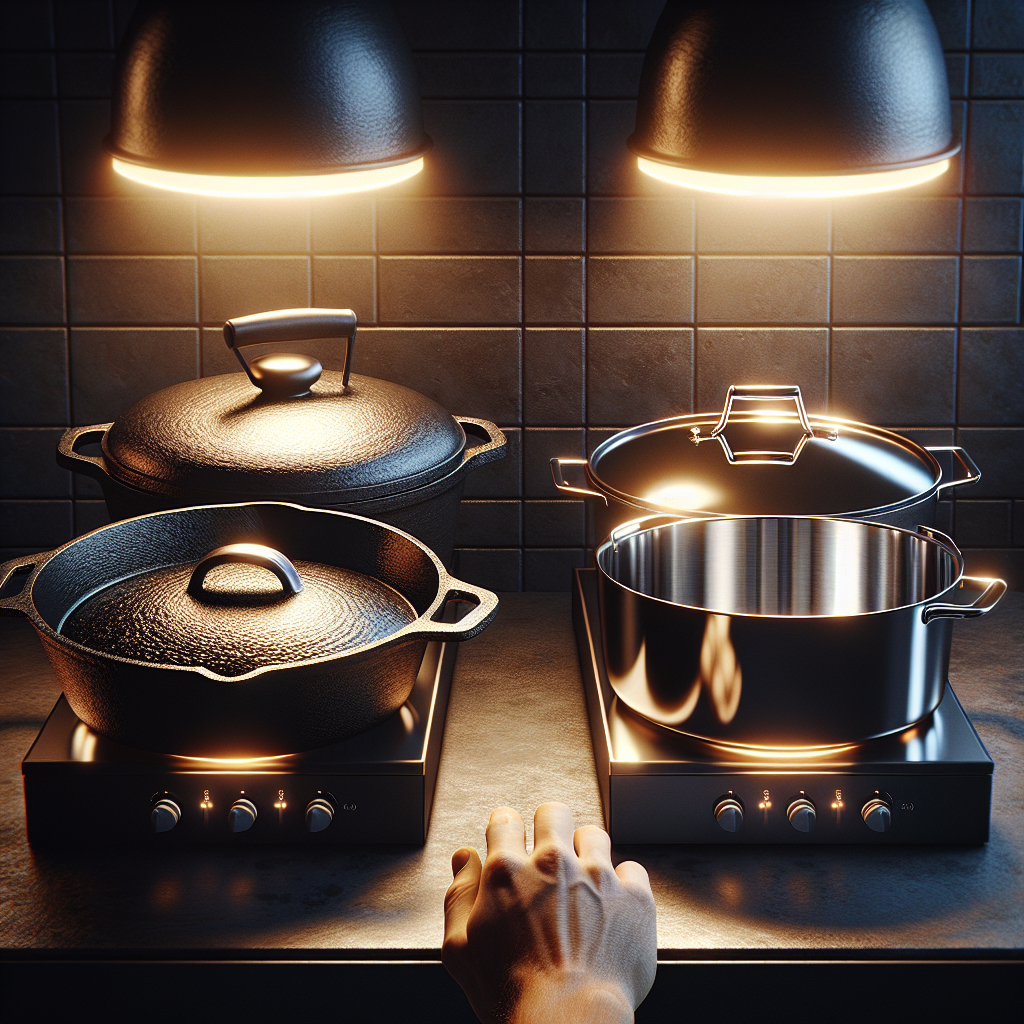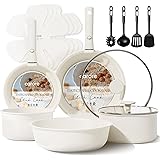Some suggestions to consider!
CAROTE 14 Pcs Pots and Pans Set Nonstick,Cookware Set Kitchen Cooking Set with Utensil and Pan Protectors
39% OffAstercook 21 Pcs Pots and Pans Non Stick Ceramic Cookware Set, Detachable Handles, RV Kitchen Cooking Set, Oven Safe, Induction Ready, Stackable, Pink
$59.99 (as of February 25, 2026 10:30 GMT +00:00 - More infoProduct prices and availability are accurate as of the date/time indicated and are subject to change. Any price and availability information displayed on [relevant Amazon Site(s), as applicable] at the time of purchase will apply to the purchase of this product.)CAROTE 17pcs Pots and Pans Set, Nonstick Cookware Set Detachable Handle, Induction Kitchen Cookware Sets Non Stick with Removable Handle, RV Cookware Set, Oven Safe
$49.97 (as of February 25, 2026 10:30 GMT +00:00 - More infoProduct prices and availability are accurate as of the date/time indicated and are subject to change. Any price and availability information displayed on [relevant Amazon Site(s), as applicable] at the time of purchase will apply to the purchase of this product.)
Understanding Your Cooking Style
Consider What You Cook Most Often
When I stepped into the culinary world, the first thing I realized is that not all cookware is created equal. The type of dishes you whip up on a regular basis can really influence your choice. If you’re the type who loves to sear meat or bake cornbread, cast iron might be your best friend. Its heat retention is phenomenal, and that gorgeous crust? Can’t be beaten.
On the flip side, if your kitchen often serves up veggies, sauces, or delicate dishes, stainless steel might be the superstar here. It’s great for keeping an eye on those flavors without the fear of sticking or ruining a delicate meal. I remember a time I tried sautéing veggies in a cast iron skillet, and let’s just say, things didn’t turn out great that time.
So, ask yourself what you really enjoy cooking. This will not only guide your choice but can also keep your cooking experiences enjoyable each time you step into the kitchen.
Frying vs. Baking: What’s Your Vibe?
I’ve come to learn that frying is where cast iron shines. Whether it’s crispy fried chicken or sautéed onions, that seasoned skillet holds the heat and gives that magical flavor. And who doesn’t love that? But if baking is where your heart lies, then stainless steel might just hold the key to your crispy, golden cookies.
Using cast iron for baking gives you that hearty feel, especially in recipes like skillet pies or baked casseroles, but they can be a bit of a hassle to deal with clean up. Just be aware that it’s not a one-size-fits-all, and understanding your favorite cooking method can make all the difference.
Think about the types of meals you’re most excited to cook. Trust me, that affects everything from your cookware choice to how you feel about making dinner on any given night!
Cleanup: A Real Deal Breaker!
Let’s talk cleanup for a second. Oh boy! Cast iron needs a bit more lovin’ after cooking. You can’t just toss it in the dishwasher; you gotta treat it gently with some soap and water and keep that seasoning going. But once you get the hang of it, the flavor it can bring to your meals is totally worth it.
On the other hand, stainless steel is super easy peasy when it comes to maintenance. You can scrub it a bit harder, toss it in the sink, and know that it’s going to shine again. It’s like the low-maintenance boyfriend of cookware. That being said, things can get pretty sticky with stainless steel if you’re not careful, but it can usually handle any mess you throw at it!
So, if you’re not keen on spending extra time cleaning up, stainless steel might be your go-to. I mean, who wants to deal with cleanup for longer than the actual cooking, right?
Budget Considerations
Initial Investment vs. Long-term Value
When I first started my cooking journey, budget was a big player. I found that cast iron pans tend to be more affordable upfront. They can often be picked up at thrift stores, and once they’re seasoned, they last forever! A solid cast iron skillet can be a lifelong companion in the kitchen.
However, stainless steel cookware typically comes with a steeper price tag. They can be a bit of an investment, but when you factor in the durability and ease of maintenance, you might just find your dollars are well spent in the long run!
So, take a moment to think about how much you’re willing to spend now and in the future. It can be a tricky balancing act, but it’s essential for making a decision that suits your pocket and your cooking adventures.
Price Over Time
Over time, I’ve noticed that what may seem like an expensive set of stainless steel pans can be a great value in the long haul. They don’t bake, chip, or rust the way cast iron can. If you’re someone who cooks often, they’ll really stand the test of time and usage.
On the flip side, cast iron can sometimes get a bad rap about requiring seasoning and special care, which leads to it sometimes needing to be replaced or repaired. If you’re up for the challenge, the cost-effectiveness can be realized when you think about the legacy of that skillet!
So in the long run, if you balance the initial investment and the usability of both materials, you might find yourself leaning more towards one over the other!
Where to Save and Splurge
As I’ve delved deep into the world of cookware, I’ve discovered that splurging on high-quality stainless steel pans is always worth it! They can withstand high heat, won’t lose their shine, and can hold up to any culinary test you throw at them. Plus, they look so sleek on the stove!
With cast iron, however, I’ve found that you can often find good deals at local markets or even garage sales. You can score a great skillet that still has a lot of life in it. Just make sure you know what to look for to avoid a dud!
In the end, it’s all about where you want to put your money: on individual high-quality pieces or doing a smart hunt for vintage gems that will serve you well for years to come.
Cooking Versatility
Brown, Sear, and Bake
One of the incredible things about cast iron is how versatile it is in cooking techniques. I can go from frying to baking and then right over to sautéing without breaking a sweat. You can cook up a storm, and if you’re daring—try some daring recipes like caramelizing veggies right next to that cornbread.
Stainless steel is no slouch either. It can handle everything from frying to making sauces, which is particularly helpful for those of us who are all about that one-pan meal life. When I’m in a rush, I love that I can throw chicken thighs in the pan and whip up a delicious sauce right in there!
Both types offer fantastic options, but choosing one can truly enhance your overall cooking experience. Knowing what techniques you’re more prone to can help guide that choice.
Recipes that Shine with Each Material
When I think about what recipes shine brightest in cast iron, I can’t help but mention cornbread and skillet pizzas. There’s just something about that crust that sends flavor over the top! Baking in cast iron gives everything a nice, rustic feel, don’t you think?
For stainless steel, making a quick, easy stir-fry is an absolute game changer. Toss in your ingredients, stir, and before you know it, you have a colorful, vibrant meal. Just remember to keep your heat at a medium high while cooking to get that sear—trust me, it makes a difference!
Think about what recipes inspire you; both types of cookware can support a wide variety of tasty outcomes!
Experimenting with Technique
I’ll be honest, trying out different cookware challenged me to up my cooking game. With cast iron, I’ve found myself developing an affinity for the sizzle and the sear—a bit of a primal connection, if you will. There’s nothing like that joyful moment of flipping over a steak and seeing that perfect crust.
With stainless steel, it challenged me to be attentive. Because things can really stick, I’ve learned the importance of timing and precision. It has made me a more thoughtful cook, paying attention to the flavors I’m creating.
So, embrace the adventure! No matter which cookware steals your heart, each can help you refine your cooking skills in unique ways. Just be daring and try new things; it’s going to benefit you in the kitchen tenfold!
Choosing Your Ideal For Cooking
Your Personal Preferences Matter
It’s important to note that your cooking preferences may shift over time. You might find yourself leaning more towards one type of cookware depending on your culinary adventures. This was the case for me when I started out primarily with cast iron, then fell head over heels for stainless steel over time.
Think about what you reach for most in your kitchen. If you find that you love the process of seasoning and nurturing cast iron, then stick with it. But if you find that stainless steel is easier to deal with and fits your lifestyle better, then go full steam ahead!
At the end of the day, it’s all about what makes you feel like a superstar in the kitchen. You shouldn’t feel boxed in by expectations; the best cookware is one that inspires you.
Emotional Connection to Cookware
Every piece I have tells a story. Each time I grab the cast iron to make a family recipe, it brings back memories of gathering around the table, laughter, and love. It’s those sentimental moments that make the act of cooking so worthwhile!
On the other hand, a sleek stainless steel pot might just give you that modern vibe and utility you thrive on. Each piece can set the tone for your kitchen and reflect your personality—whether it’s rustic and charming or modern and sleek.
So think about what connects for you on an emotional level. It really does make a difference on how you use your cookware and how much joy it brings into your kitchen!
Final Thoughts on Choosing
Ultimately, my advice is to focus on what you love. Don’t let others dictate what cookware you should have in your kitchen. Try to make room for both materials. They each offer their own wonderful feelings and experiences! Dive into the world of cooking with joy.
Whatever your choice, embrace it. Your kitchen should be a canvas for creativity, and both cast iron and stainless steel can serve as your brushes. It’s all about what works for you, your style, and your culinary dreams!
FAQs
1. Can I use stainless steel for high-heat cooking?
Absolutely! Stainless steel is great for high-heat cooking, but it’s crucial to preheat the pan to avoid sticking. It’ll give you a perfect sear on your meats!
2. Do I need to season cast iron cookware?
Yes, seasoning is important for cast iron. It creates a non-stick surface and enhances flavor. It’s a fun process that’s well worth the effort.
3. Is stainless steel dishwasher safe?
Most stainless steel pots and pans are dishwasher safe; however, hand washing is often recommended to maintain their shine and prevent any warping.
4. Can I bake in stainless steel cookware?
Certainly! Just keep in mind that things might cook differently than cast iron. Using parchment paper can help avoid sticking issues.
5. Which type of cookware is better for beginners?
It generally depends on the preference; stainless steel might be easier for those starting out due to its low maintenance. However, a basic cast iron skillet can also provide excellent results with a little care!








